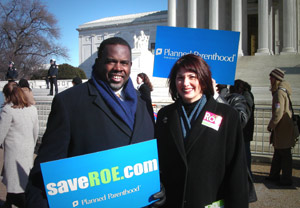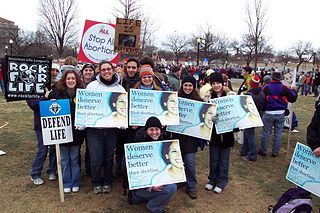Related Research Articles

The United States abortion-rights movement is a sociopolitical movement in the United States supporting the view that a woman should have the legal right to an elective abortion, meaning the right to terminate her pregnancy, and is part of a broader global abortion-rights movement. The movement consists of a variety of organizations, with no single centralized decision-making body.

Abortion is a divisive issue in the United States. The issue of abortion is prevalent in American politics and culture wars, though a majority of Americans support continued access to abortion. There are widely different abortion laws depending on state.
The abortion debate is a longstanding, ongoing controversy that touches on the moral, legal, medical, and religious aspects of induced abortion. In English-speaking countries, the debate most visibly polarizes around adherents of the self-described "pro-choice" and "pro-life" movements. Pro-choice supporters uphold that individuals have the right to make their own decisions about their reproductive health, and that they should have the option to end a pregnancy if they choose to do so, taking into account various factors such as the stage of fetal development, the health of the mother, and the circumstances of the conception. Pro-life advocates, on the other hand, maintain that a fetus is a human being with inherent rights that cannot be overridden by the mother’s choice or circumstances, and that abortion is morally wrong in most or all cases. Both terms are considered loaded in mainstream media, where terms such as "abortion rights" or "anti-abortion" are generally preferred.

The Partial-Birth Abortion Ban Act of 2003 is a United States law prohibiting a form of late termination of pregnancy called "partial-birth abortion", referred to in medical literature as intact dilation and extraction. Under this law, any physician "who, in or affecting interstate or foreign commerce, knowingly performs a partial-birth abortion and thereby kills a human fetus shall be fined under this title or imprisoned not more than 2 years, or both". The law was enacted in 2003, and in 2007 its constitutionality was upheld by the U.S. Supreme Court in the case of Gonzales v. Carhart.
Anti-abortion violence is violence committed against individuals and organizations that perform abortions or provide abortion counseling. Incidents of violence have included destruction of property, including vandalism; crimes against people, including kidnapping, stalking, assault, attempted murder, and murder; and crimes affecting both people and property, as well as arson and terrorism, such as bombings.

The United States anti-abortion movement opposes induced abortion, in-vitro fertilization, and some or all forms of birth control. Advocates support legal prohibition or restriction on both moral and religious grounds, arguing that human life begins at conception and that the human zygote, embryo or fetus is a person and therefore has a right to life. The anti-abortion movement includes a variety of organizations, with no single centralized decision-making body. There are diverse arguments and rationales for the anti-abortion stance. Some allow for some permissible abortions, including therapeutic abortions, in exceptional circumstances such as incest, rape, severe fetal defects, or when the woman's health is at risk.
City of Akron v. Akron Center for Reproductive Health, 462 U.S. 416 (1983), was a case in which the United States Supreme Court affirmed its abortion rights jurisprudence. In an opinion by Lewis F. Powell Jr., the Court struck down several provisions of an Ohio abortion law, including portions found to be unconstitutionally vague.
Conscience clauses are legal clauses attached to laws in some parts of the United States and other countries which permit pharmacists, physicians, and/or other providers of health care not to provide certain medical services for reasons of religion or conscience. It can also involve parents withholding consenting for particular treatments for their children.

George Richard Tiller was an American physician and abortion provider from Wichita, Kansas. He gained national attention as the medical director of Women's Health Care Services, which, at the time, was one of only three abortion clinics nationwide that provided late-term abortions.
This is a timeline of reproductive rights legislation, a chronological list of laws and legal decisions affecting human reproductive rights. Reproductive rights are a sub-set of human rights pertaining to issues of reproduction and reproductive health. These rights may include some or all of the following: the right to legal or safe abortion, the right to birth control, the right to access quality reproductive healthcare, and the right to education and access in order to make reproductive choices free from coercion, discrimination, and violence. Reproductive rights may also include the right to receive education about contraception and sexually transmitted infections, and freedom from coerced sterilization, abortion, and contraception, and protection from practices such as female genital mutilation (FGM).
Abortion has been legal in India under various circumstances with the introduction of the Medical Termination of Pregnancy (MTP) Act, 1971. The Medical Termination of Pregnancy Regulations, 2003 were issued under the Act to enable women to access safe and legal abortion services.

Merle Hoffman is an American journalist and activist.

The legality of abortion in the United States and the various restrictions imposed on the procedure vary significantly depending on the laws of each state or other jurisdiction. Some states prohibit abortion at all stages of pregnancy with few exceptions, others permit it up to a certain point in a woman's pregnancy, while others allow abortion throughout a woman's pregnancy. In states where abortion is legal, several classes of restrictions on the procedure may exist, such as parental consent or notification laws, requirements that patients be shown an ultrasound before obtaining an abortion, mandatory waiting periods, and counseling requirements.
William Floyd Nathaniel Harrison was an American obstetrician who delivered 6,000 babies and then switched to abortions, performing the procedure an estimated 20,000 times in his career. He became one of the only doctors in Northwest Arkansas to provide this service to women, as other physicians stopped offering to perform abortions. His Fayetteville Women's Clinic was frequently picketed and blocked by anti-abortion protesters.

Linda Prine is a family physician, professor, and non-profit founder. She held many leadership positions in the New York State Academy of Family Physicians and was the Women’s Health Director at a large FQHC in New York. In 2000 she co-founded the Reproductive Health Access Project. She remains the fellowship director of the Reproductive Health Access Project fellowship, and residency teacher at the Harlem and Mount Sinai Downtown Family Medicine residencies. In 2019 she co-founded the Miscarriage and Abortion Hotline where she still volunteers.
Abortion in Uganda is illegal unless performed by a licensed medical doctor in a situation where the woman's life is deemed to be at risk.
National Institute of Family and Life Advocates v. Becerra, 585 U.S. 755 (2018), was a case before the Supreme Court of the United States addressing the constitutionality of California's FACT Act, which mandated that crisis pregnancy centers provide certain disclosures about state services. The law required that licensed centers post visible notices that other options for pregnancy, including abortion, are available from state-sponsored clinics. It also mandated that unlicensed centers post notice of their unlicensed status. The centers, typically run by Christian non-profit groups, challenged the act on the basis that it violated their free speech. After prior reviews in lower courts, the case was brought to the Supreme Court, asking "Whether the disclosures required by the California Reproductive FACT Act violate the protections set forth in the free speech clause of the First Amendment, applicable to the states through the Fourteenth Amendment."
Conscientious objection to abortion is the right of medical staff to refuse participation in abortion for personal belief.
Abortion in Ohio is legal on request up to the point of fetal viability. After viability, abortion is legal if, in the professional judgement of an attending physician, the abortion is necessary to protect the pregnant individual’s life or health.
Mazurek v. Armstrong, 520 U.S. 968 (1997), was a United States Supreme Court case in which the Court upheld a Montana law permitting only licensed physicians to perform abortions. The Court summarily reversed a ruling of the United States Court of Appeals for the Ninth Circuit that had held that the law was likely intended to inhibit abortion access. In a per curiam opinion, a majority of the Court found that there was no evidence that the Montana legislature acted with an invalid intent. The Court also reiterated its earlier holding in Planned Parenthood v. Casey that the states have broad flexibility to regulate abortion so long as their regulations do not create an undue burden on a woman's right to choose. Three dissenting justices, in an opinion by Justice John Paul Stevens, wrote that they would have declined to hear the case because proceedings were still pending in the lower courts. The law itself was later struck down by the Montana Supreme Court on state-constitutional grounds.
References
- ↑ Ajaka, Nadine (June 17, 2016). "The Courage to Perform Abortions". Independent Lens . The Atlantic . Retrieved May 7, 2017.
- ↑ Karkowsky, Chavi Eve (May 3, 2017). "Willie Parker's Moral Argument for Choice Made Me a Better Doctor". Slate . Retrieved May 7, 2017.
- ↑ Rosenblatt, Kalhan (May 4, 2017). "Christian Abortion Doctor Risks Safety to Keep Reproductive Healthcare in the South". U.S. News . NBC News . Retrieved May 7, 2017.